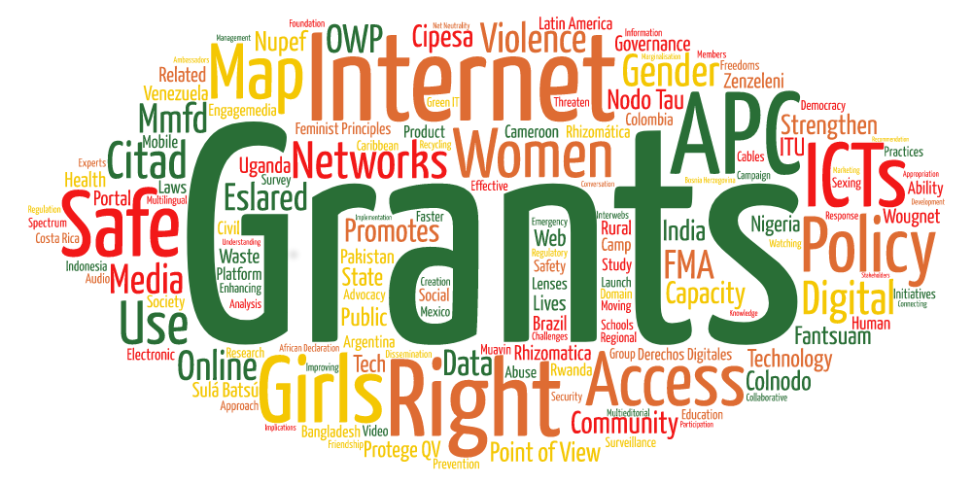
APC’s subgranting programme in its second year awarded a total of USD 273,986 to support its members in achieving APC’s vision. Eighteen member organisations were recipients of 21 grants, 10 of which are project grants of up to USD 20,000 each, while the other 11 are research and campaign grants of up to USD 5,000 each. Funds were also used to support the research of 28 national reports for the 2017 Global Information Society Watch (GISWatch) report.
APC’s subgranting programme aims to enable members to contribute to changes towards achieving APC’s vision. APC offered two types of grants in 2017: project grants and research and campaign grants.
The project grants are intended to contribute to the implementation of APC’s strategic plan at the national level, as well as to strengthen ongoing work of APC members that is linked to APC’s strategic priorities.
The research and campaigns grants contribute to members’ advocacy work, and are also meant to enable members to participate in APC-wide campaigns.
The subgrants awarded in 2017 include the following countries: Argentina, Bangladesh, Bosnia and Herzegovina, Brazil, Colombia, Cameroon, Costa Rica, Gaza strip, India, Nigeria, Pakistan, Philippines, Rwanda, South Africa and Venezuela. Two other projects are regional in scope, in the Latin American region.

This year’s successful grants include projects that tackle an array of technical and rights issues, ranging from ending violence online and offline, local access and community networks, spectrum policies and practices, the African Declaration on Internet Rights and Freedoms, digital rights, net neutrality, access to the internet and to information, and online mapping of rights data, among other relevant themes.
-
How can we enhance the capacity of women and girls to deal with the issues of gender-based violence online, and raise public awareness on how these issues can be addressed by society?
-
How can we map tech-related projects on women's rights that took place in Latin America during 2017, and then disseminate them?
-
How can we help promote justice by mapping political killings and building a centralised database online?
-
How do we enhance the media’s understanding, capacity and subsequently coverage of digital rights violations and related internet policy issues?
-
How to we create and maintain a web-based review of rules and regulations affecting spectrum policies and practices and how they impact on local communities?
-
How can we provide long-term and sustainable support to the ecosystem of organisations and people that work with survivors of violence by adding an awareness of the mis(use) of information and communications technology (ICT) to their work?
-
How do we help women's rights and sexual rights activists better understand how digital rights relate to their lives or those of the constituencies they work with?
-
How can we analyse whether a government is ready to allow the internet to fully express its potential through application of the key principles of the African Declaration on Internet Rights and Freedoms?
-
How can we address the major connectivity gaps that exist in rural areas of Latin America, specifically in Afro-descendent, indigenous and campesino populations?
-
How can we support a community in harnessing internet access infrastructure to facilitate and enable social and economic outcomes for its people?
-
How can we research and campaign for net neutrality in order to allow the internet to be free and open by preventing service providers from slowing down or interfering with the transfer of data?
-
How can we contribute with substantive submissions related to the digital rights situation in the country to the African Commission on Human and Peoples’ Rights (ACHPR) review?
-
How can we research access to and use of the internet in girls' secondary schools?
-
What can we deduce from the analysis of policies that threaten access to the internet in Venezuela, resulting from the state of emergency during the period 2016 to 2017?
-
How do we tackle the policy and regulatory challenges for community networks in Nigeria?
-
How can we develop an app based on the concepts from a previous grant-supported project on "Countering abuse: Technology and awareness for countering online abuse and harassment”?
These are just some of the exciting questions raised by the projects funded with grants by APC in 2017. All projects and activities are expected to be completed by the end of April 2018.
APC’s subgranting programme is made possible through the support of the Swedish International Development Cooperation Agency (Sida).
Check out all the project grants for local implementation of APC’s strategic plan in 2017 here.
Check out all the small grants for research and campaign support in 2017 here.